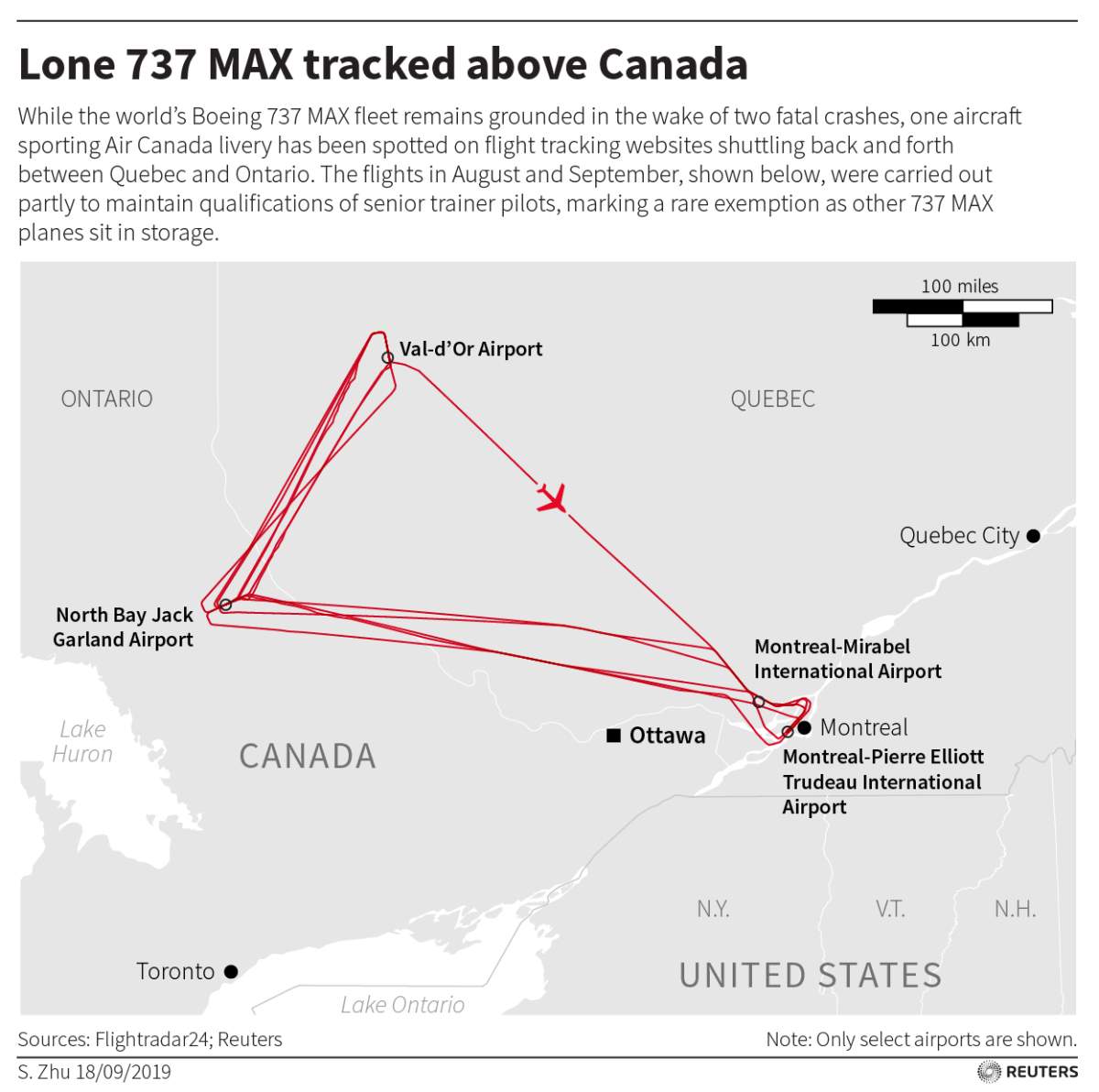While the world’s Boeing 737 MAX fleet remains grounded after two fatal crashes, a solitary Air Canada plane has been spotted in the skies, shuttling between Quebec and Ontario.

In a rare exemption, approved by Canadian aviation regulator Transport Canada, the 11 flights in August and September were partly to maintain the qualifications of senior training pilots, Air Canada told Reuters in response to a query about flight tracking data.
READ MORE: Boeing 737 Max 8 ban extended to holiday season — how will that impact flights?
A spokesman for Air Canada said the airline was not able to use similar 737s within its fleet “to maintain check pilot authority in alignment with (Canadian aviation regulations)”.
“So we are utilizing the 737 Max during planned maintenance movements to maintain qualification.”
Between Aug 28 and Sept 8 the Air Canada MAX plane criss-crossed between Montreal, Val d’Or, Quebec and North Bay, Ontario, data from Tracking website FlightRadar24 shows.
Then last week, it was flown to Pinal Airpark in Arizona to be parked in a desert storage site.
Although unusual after the grounding imposed worldwide in March amid concerns over an anti-stall system, the flights highlight growing pressures facing some airlines as they prepare for the return to service of the 400-plane Boeing fleet.

Get daily National news
The planes have been sitting idle since March following two crashes in the space of five months.
For airlines like Air Canada, which did not have earlier versions of Boeing 737s in their fleets, this has made it difficult to make sure pilots can demonstrate the skills required to retain their licenses.
As North America’s sole MAX operator which had not flown the earlier 737NG, Air Canada cannot use that model to maintain the qualifications of its check or trainer pilots, the company said.
WATCH: Boeing to ramp-up production of 737 MAX in anticipation of regulatory approval

So regulator Transport Canada authorized a select group of Air Canada‘s check pilots to fly the grounded jet, which was also conducting maintenance flights, the airline said.
All the jets have the same control software suspected of contributing to the accidents, which Boeing is now in the process of revising to smooth its impact. However, some pilots have said existing procedures can prevent similar accidents.
Boeing declined to comment.
MARKET BATTLE
Transport Canada said in an email that it authorized the flights “because the carrier does not operate the Boeing 737 NG aircraft, but the pilots still need to maintain currency.”
However, one U.S. carrier questioned by Reuters said such flights would not be possible in the United States where pilot training was not included in a list of exemptions to the ban issued by the Federal Aviation Administration.
“Pilot currency isn’t a listed exemption in the U.S. order,” an FAA spokeswoman confirmed.
North American MAX operators, including Southwest Airlines , American Airlines, United Airlines and Canada‘s WestJet Airlines, said they would only move their MAX jets for maintenance and storage purposes.
WATCH: Canadian family of Ethiopian Airlines crash victim calls on FAA, Boeing to investigate 737 MAX

Air Canada‘s position as a newly-converted 737 operator follows a seven-year battle between Boeing and Airbus over the introduction of airplanes offering bold new fuel savings.
The introduction of the MAX, an upgrade of earlier 737 models with advanced new engines, coincided with a bitter contest for market share between Boeing and Europe’s Airbus , which was offering its similar A320neo.
The feud saw both planemakers use the transition to a new generation of jets to try to poach each other’s customers, and traders said Air Canada‘s 2013 decision to switch from Airbus’s A320 family to Boeing’s 737 MAX stood out as a major defection.
Now, the decision to switch suppliers potentially weighs on some of those same airlines as they cope without a 737 fleet.
Boeing has predicted that the 737 MAX will be cleared to take passengers early next quarter.
The FAA, facing growing international scrutiny over its certification processes, has said it cannot give a precise date for the approval of software and training changes carried out in the wake of the two accidents, which killed 346 people.
FAA chief Stephen Dickson plans to fly to Seattle this week to test modified 737 MAX software in a simulator.








Comments